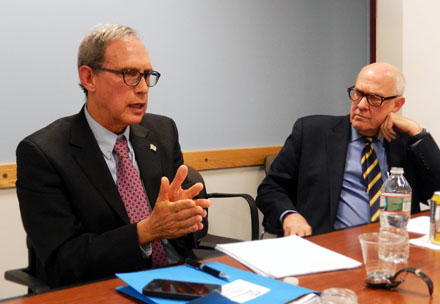Media plays large role in shift from hard to soft power, says Knesset member Nachman Shai

April 1, 2014 – Nachman Shai, a former journalist who currently serves as a member of the Knesset, spoke to the Shorenstein Center about the rise of “soft power” as the dominant force in “asymmetric confrontations” between strong and weak powers.
Now that the battle has moved from hard power to soft power, Shai pointed out, Israel must “showcase its moral standards.” This moral capacity has always been a component of Israel’s national identity, but “not the whole story.” Now, Shai said, “military and economic power are not enough in and of themselves.”
According to Shai, the media has played a significant role in this shift from hard to soft power. “In the Palestine conflict,” he said, “Israel used to enjoy a monopoly over the flow of information.” But Palestine has “learned to play the game.” It has “developed communication perception…and created an alternative source of information from Israel’s.” He cited instances of individual journalists who were willing to go along with Palestine’s stipulations in order to get access to stories.
The Internet has shifted the conversation so that now, weaker powers receive more news coverage than in the past when there was only a centralized media source. Shai concluded that in order to win the soft-power battle, Israel needs to continue marketing itself as a “country of ideals, moral values and high-tech innovation.”
Article and photo by Janell Sims, Shorenstein Center.